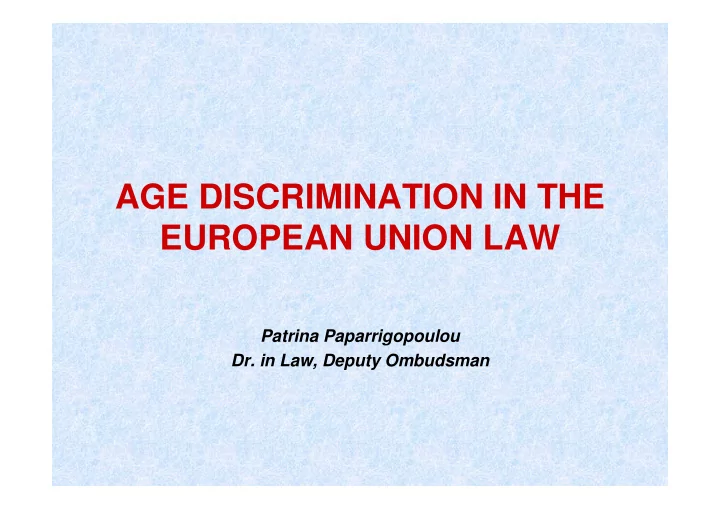

AGE DISCRIMINATION IN THE EUROPEAN UNION LAW Patrina Paparrigopoulou Dr. in Law, Deputy Ombudsman
Age as a criterion of discriminations in the European Union’s legislation The Framework Employment Directive differs from the Racial Equality Directive and the Revised Equal Treatment Directive in the followings: The application of the Framework Employment Directive is limited in • the fields of employment-occupation. • Direct discrimination on grounds of age in employment – occupation is to be prohibited, unless it is objectively justified or it is a genuine occupational requirement. • Differences in experience and qualifications that often exist between persons in similar age make difficult the identification of a comparator • It is difficult to infer that less favourable treatment has taken place on the basis of indirect age-discrimination. Criterions as experience, seniority, health etc. have by definition a negative impact upon age groups and therefore have to satisfy the objective justification test .
Legitimate age discriminations There are two cases where age discrimination is justified: a) When age is a genuine and determining occupational requirement for a particular post (art. 4 par. 1). However, it is difficult to see many circumstances when age is a genuinely a requirement. b) When age is objectively necessary to achieve a valuable social aim (art. 6 par. 1). In case Mangold the ECJ decided that the Directive doesn’t preclude a • provision of national law, which authorizes the conclusion of fixed-term employment contracts with workers aged 52 and over because it aims to promote the vocational integration of unemployed older workers, in so far as they encounter considerable difficulties in finding work. • In case Cadman, the ECJ decided that the employer does not have to establish specifically that recourse to the criterion of length of service as a determinant of pay is appropriate to reward experience as regards a particular job, unless the worker provides evidence capable of raising serious doubts in that regard.
Legitimate but disproportionate age discriminations The proportionality is controlled by a case -by case analysis. For example: • In Netherlands, the Commission for Equal Treatment examined three cases of discriminations against older people in the field of the conventions between doctors older than 60 years and the insurance companies. The Commission decided that there are reliable methods for the appreciation if a doctor is apt to continue working. The use of these methods is in the responsibility of the National Union of Doctors who keeps the Doctors Register. • In case Mangold the ECJ decided that German legislation that takes the age of the worker concerned as the only criterion for the application of a fixed term contract of employment goes beyond what is appropriate and necessary in order to attain the objective pursued. It had not been shown that fixing an age threshold, regardless of any other consideration linked to the structure of the labour market in question or the personal situation of the person concerned, was objectively necessary to the attainment of the legitimate objective (vocational integration of the unemployed older workers).
Difficulties where employment, social security and anti- discrimination legislation are met a) The Directive doesn’t affect national provisions for retirement age (state imposed pensionable ages) (Recital 14 ) In case Felix Palacios de Villa the General Advocate examined the • question whether compulsory retirement provisions of collective agreements, used by the Spanish law as a mechanism for promoting intergenerational employment, are compatible with Directive 2000/78 and art. 13 TEC. The Advocate General concludes that a national law providing for the setting of a compulsory retirement age does not fall into the scope of Directive 2000/78. The decision of the Court will be of great interest, because in theory the opposite opinion has been supported. According to Colm O’ Cinneide State imposed mandatory retirement ages may be exempt by virtue of art. 3 par. 3 if they can be classed as part of state social security schemes. Otherwise, they require justification under art. 6 par. 1. The reason is that in the Recital 14 it is provided that the Directive doesn’t affect mandatory retirement age but in the text there is no further reference.
Difficulties where employment, social security and anti- discrimination legislation are met b) The Framework Employment Directive doesn’t apply to the state social security and social protection schemes. However, the different pensionable ages for men and women have an impact upon the equality Directives, because they can, under certain circumstances, justify the difference of treatment.
Difficulties where employment, social security and anti- discrimination legislation are met c) The Framework Employment Directive’s field of application extends only to the contractual or employee retirement ages. However, Member States are permitted by virtue of art. 6 par. 2 to introduce special exemptions for the use of age-based criteria in the field of occupational social security schemes. • In decision Confédération Générale du Travail et al. the ECJ decided that Directive 2002/14 precludes provisions of French law which provide that an employee engaged after 22 June 2005 who is under 26 years of age shall not be taken into account in calculating the size of workforce of the undertaking by which he is employed until he reaches the age of 26, whatever the nature of his contract with the undertaking. If Directive 2000/78 was to be applied, these provisions could be considered as positive action in favor of the employment of young people.
Conclusions The application of the anti – discrimination European legislation obliges Member states to re-examine labour law and social protection law in order to abolish unjustified national provisions that are based on age criteria. The Courts and the competent for the application of the Directive authorities have a crucial role showing the cases where the use of age criteria is unlawful or non proportionate. The anti-discrimination legislation is spreading in a fast way and shoots down generalized assumptions and stereotypes, as that older people lack motivation and the ability to adopt new ideas or that younger people lack maturity.
Recommend
More recommend